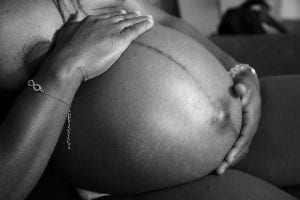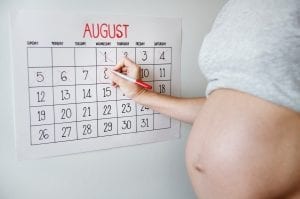Pregnancy: The Last Few Weeks
In the last few weeks of your pregnancy, contractions can turn into an alarm: they signal that you’re going through labor. However, some contractions aren’t the real thing.

Contractions like these are identified as Braxton-Hicks contractions. You can look at it as a practice run for your body to get ready for the big show, which is giving birth to your baby. But, remember, these contractions don’t mean that you’re about to welcome your baby to the world.
Unsure whether the contractions you’re having are Braxton-Hicks or real? Here’s how to differentiate them – Braxton hicks versus real contractions:
Braxton-Hicks Contractions
Named after the doctor who coined the term, Braxton-Hicks contractions are contractions that may feel like you’re going through real labor contractions when, in fact, you’re not.

They won’t lead to the actual delivery, but Braxton-Hicks contractions can make the cervix narrow similarly to true labor contractions.
Braxton-Hicks contractions usually begin in the 28th week of pregnancy. You will feel them occasionally, especially in the afternoon or at night after a lot of activity. There is no noticeable pattern, but Braxton-Hicks contractions may frequently happen the nearer you are to your due date.
As mentioned also on WhatToExpect, being hit with a Braxton-Hicks contraction will cause your abdomen to tighten. Most of the time, it is not extremely painful, but it can hurt. Here is one of the things about Braxton hicks versus real contractions – the pain is difficult to differentiate.
Signs of experiencing Braxton-Hicks contractions are the following: contractions that sometimes come and go; it doesn’t get painful or closer together; contractions that disappear when you pee or switch positions.
True Labor Contractions
True labor contractions occur when a hormone in your body called oxytocin is released. This hormone makes your uterus contract and signals that you are going through labor. For most mothers, true labor contractions begin around 40 weeks into the pregnancy. However, true contractions that occur before 37 weeks can mean that you’re going through preterm labor.

When you’re experiencing true labor contractions, your cervix will thin out, and the upper part of your uterus will tighten for the baby to go down the birth canal. This way, you can prepare for the delivery.
A real contraction is something akin to a wave. When you start feeling it, the pain that you’ll feel starts low, then moves up until it reaches the ultimate peak, and retreats. Your abdomen will feel hard when you touch it.
One clue to figure out that you’re in real labor is when the timing of your contractions are spaced very evenly, and it gets shorter as it goes on. For example, your contractions come back every five minutes, then it decreases to three, to two, and so on. Over time, your contractions will get very painful.
There are many other signs when you’re going into labor, such as:
- A clump of bloody or pink-like mucus when you make a trip to the toilet.
- The feeling that your baby has “dropped” in your stomach or belly.
- Vaginal leakage. It means that your water has broken.
Braxtons-Hicks Versus Real Contractions: How Can I Distinguish Them?
Braxton-hicks versus real contractions overview:

- When they occur:
- Braxton-Hicks contractions may occur around the 13th to 27th week, but they usually start during the third trimester.
- Real labor contractions should begin after 37 weeks into your pregnancy (otherwise, it may mean that you’re going through premature labor).
- How frequently they occur:
- Braxton-Hicks contractions happen randomly and with no apparent pattern.
- Real labor contractions come at regular periods, which shortens as more time goes on.
- How long they last:
- Braxton-Hicks contractions last for as short as 30 seconds or go on for 2 minutes.
- Real labor contractions range at 30 to 70 seconds.
- How they feel:
- Braxton-Hicks contractions a tightening in the abdomen, but they are usually not painful.
- Real labor contractions get stronger and intense over time, and they come in waves from the back than the front.
What Should I Do When I’m Experiencing Contractions?
Contractions that occur sometimes or come and go are most likely false contractions. However, if your contractions are regularly coming, try timing yourself (1 hour). If they get more intense as time passes, you are probably going through real labor.
If your contractions are around five or six minutes apart, it is high time to go to the hospital with your baby bag ready.
If you’re unsure of whether or not you’re actually in labor, consult your doctor or pay a visit to the hospital. It’s way better to seek for professional help even if it might be a false alarm.
Another thing to keep in mind is to make sure that you go to the hospital when your contractions are excruciating, or your water has broken before the 37th week of your pregnancy.
When Should I Call My Healthcare Provider?

Don’t ponder over whether or not you’re bothering your doctor, even if you think it might be a false alarm. Call your doctor or midwife and consult them on what’s normal or not. They should be willing and available at any time to answer your questions and to talk about your worries and concerns about your contraction. Never hesitate to call.
Immediately call your doctor or midwife, no matter what time, if you’re experiencing any of the following:
- Vaginal bleeding
- Ongoing leaking of fluid or when your water breaks (maybe gushing or a trickling)
- Intense contractions every 5 to 6 minutes for about an hour
- Contractions that you cannot handle.
- You notice a change in your baby’s movement, or if you feel that there are less than ten movements every 2 hours.
- Any signs of actual labor contractions before your 37th week of pregnancy.
What Mothers Say About Braxton-Hicks Contractions

“I didn’t feel or notice them until I brushed over my belly and realized it was hard.”
“I thought they were supposed to be painless?”
“I think I hardly noticed them in my first pregnancy. But the second time around, I REALLY noticed them more. Maybe it was because I knew what to look out for, or I was already having a second baby.”
“Didn’t feel any false contractions at all. I might’ve had them, but I didn’t feel like I did. But I knew something was going on when I went from four to five centimeters when I visited my doctor.”
FAQs On Braxtons-Hicks Versus Real Contractions
What is Braxton Hicks?
Braxton Hicks is also known as false labor. It is when the womb contracts and relaxes after. Others may experience it between the second and third trimester, but others also don’t.
How can I tell Braxton Hicks from real contractions?
Braxton Hicks contractions do not lead to birth. They may be painful, but the pain will not last that long. Unlike from real contractions, the pain of contraction will be long and consistent and will be felt around the abdomen, and the lower part of your body like legs and lower back.
What do early labor contractions feel like?
Some mommies may experience painful early labor contractions, and I can say that it’s not easy. Usually, one may experience like having dysmenorrhea or menstrual cramps or painful pressure in the lower abdomen area.
Do labor contractions feel like Braxton Hicks?
Yes, there are times when you feel like you are about to give birth, but it’s only Braxton Hicks that you are feeling. New moms usually experience this. But Braxton Hicks isn’t that very painful, unlike the time when you will have real labor contractions.
What triggers Braxton Hicks?
Physical activity and dehydration may trigger Braxton Hicks. So drinking more water may help in avoiding false labor contractions.
How can I tell if I m having a contraction?
If you are near your labor due date, you may now possibly experience contractions. Contractions are when your uterus or your abdomen feels like being tightened like a fist and relaxes a few seconds after.
Can stress cause Braxton Hicks?
According to researchers, stress does not cause Braxton Hicks, but more physical activity may do. You can drink more water to hydrate yourself and avoid too much physical activity so as not to trigger Braxton Hicks.
Is it normal to have Braxton Hicks all day?
Braxton Hicks usually last for just a few seconds and maybe gone after you change position. But if you are experiencing this whole day, you may consult your ob-gyne to make sure that everything is fine and to know if you are still having false or true labor contractions already.
Are Braxton Hicks a good sign?
Yes, experts say that Braxton Hicks is a good sign. This is because this is a sign that your womb is being prepared for real labor contraction.
Does Braxton Hicks mean baby will come early?
It does not necessarily mean that if you are experiencing Braxton Hicks, labor is near. Not all mommies experience Braxton Hicks, though. So don’t panic if you are having small contractions in the second trimester of your pregnancy.
Do Braxton Hicks affect the baby?
Braxton Hicks may be annoying and uncomfortable, but certainly, they do not affect the baby in your womb. If you are experiencing Braxton Hicks, you may try changing your current position so the contraction will disappear.
How long does false labor last before real labor?
If you are already in the last few weeks of pregnancy, you may feel anxious, especially if you are having signs of contraction. But experts cannot tell on how long you will experience false labor before experiencing the real one. Try to talk to your ob gyne so that you will have firsthand information on what signs to expect if you are already near “real labor” because different women may experience various kinds of labor contractions.
Where do you feel real contractions?
Real contractions are usually felt in the lower abdomen or lower pelvic part. It may start in the back part and move to the front, but real labor is where you can experience severe pain that you can’t almost understand where it’s coming from.
Do contractions make you poop?
Experiencing real contractions may give you the feeling that you may poop anytime. But contraction does not make you poop, but others poop during these times.
Can you be in labor and not know it?
Every woman may feel differently during labor. But you can consult your ob gyne or feel your body for signs of real labor contractions. Some are in labor already but do not know it, but most of the time, there will be signs that we will feel so we can be ready in giving birth.
Last Updated on January 12, 2023 by Rejie Salazar
DISCLAIMER (IMPORTANT): This information (including all text, images, audio, or other formats on FamilyHype.com) is not intended to be a substitute for informed professional advice, diagnosis, endorsement or treatment. You should not take any action or avoid taking action without consulting a qualified professional. Always seek the advice of your physician or other qualified health provider with any questions about medical conditions. Do not disregard professional medical advice or delay seeking advice or treatment because of something you have read here a FamilyHype.com.